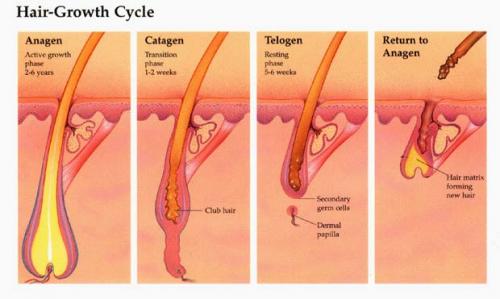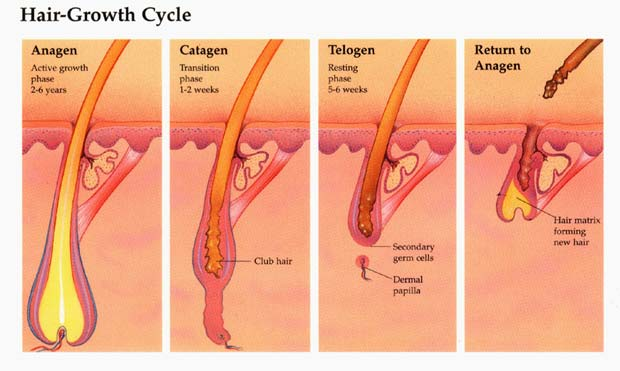Why is there Hair Fall During and After Pregnancy?

Telogen effluvium is the medical term used for the excessive shedding of hair that happens a few months after pregnancy. This is very common, and it affects about half of all pregnant women.
Since it is due to the sudden hormonal changes in a female’s body during pregnancy, it gradually decreases and goes back to what was normal for that individual. In some cases it may not revert to normal and may require treatments and in extreme cases a hair transplant as well. Although Female Hair Transplant has started to gain more acceptance in recent times, it is important to understand why there occurs a sudden rise in hair fall during pregnancy before opting for one.

Hair fall during Pregnancy:
Hair loss that is connected to pregnancy usually occurs after delivery. But, even during pregnancy, the number of hair in the resting phase increases and this is considered normal since the body is trying to provide more and more nutrition to the fetus instead of it being sent to the comparatively “unnecessary” cells such as the hair and nails.
This condition is not serious enough to cause permanent hair loss or balding, and it usually begins to diminish within a few months after delivery. It may also be due to a nutritional deficiency. Refer to a dietician if this is the case to recover from any vitamin or mineral deficiency.
Hair Fall after Pregnancy:
Hair fall is most extensive during this period. It occurs after delivery. The rise in hormones during pregnancy prevents an earlier loss of your hair. After delivery, since the hormones return to normal levels, the hair that was arrested in the anagen phase starts to enter the telogen phase and hence there is an increase in the levels of hair fall. The normal hair loss that was earlier delayed during pregnancy may fall out all at once now.
The hair that was previously in the growth state may enter into the telogen or the resting state. The hair loss usually increases 3–4 months after delivery as the hair follicles start going back to normal. This is however, completely normal and the hair goes back to its usual cycle of growth, rest and fall in about 6 months to one year.
Hair Fall Due to other Reasons in Females:
Hair loss can be triggered by anything that involves a change in the estrogen hormone balance in your system. The most common reason for this is the increase in the levels of DHT in females as well. DHT is a testosterone derived androgen that causes the development of secondary sexual characters in males and is also the reason behind the male pattern of alopecia. This hormone, though in low quantities, is present in females too and when these levels rise beyond the normal levels it leads to balding in females as well. Other reasons of hair fall in females may be other conditions that cause a disturbance in the hormonal levels too such as in PCOD. It can also be as a result of medicines that do not react well with the body. There are also other reasons related to the reproductive health of a female that may result in hair loss. There are:
- Stoppage of birth control pills or any other hormonal type of birth control method
- Miscarriage
- Induced Abortion
Positive Effect on your Hair of Pregnancy:
Since there is an increase in the level of estrogen during pregnancy, it causes hair to remain in the growing phase and stimulates the growth of your hair for longer periods of time.
Tips to Prevent Excessive Hair Loss due to Pregnancy:
- Consult with your health care provider to ensure a proper balance of hormones. Some treatments, such as in IVF Pregnancies, have a plan that includes hormones as a part of ingestible medicines or as local applications. These can result in hormonal changes in your body and may be a reason for excessive hair loss too.
- Avoid tight hair styles.
- Eat a healthy diet high in nutrients, to provide protection for the hair follicles and encourage hair growth.
- Use good quality shampoos and conditioners.
- Use wide toothed combs to prevent breakage, especially in wet hair.
- If you need to blow dry your hair or get them straightened, try not to do it too often and prefer the low heat option in appliances.
Supplement your diet with these nutrients:
1. Vitamin B complex
2. Biotin (After consulting your doctor)
3. Vitamin C
4. Vitamin E (After consulting your doctor)
5. Zinc (After consulting your doctor)
The most important aspect is to not fret too much over some hair fall and to enjoy the overall experience of your pregnancy. If hair fall exceeds too much even though quite some time has passed since your delivery and if no treatments are working for you then pregnancy may have just accelerated an impending hair loss. Consult a specialist in that case and consider getting a Hair Transplantation if there is significant balding or if the hair loss is of great concern.
Post Your Ad Here
Comments